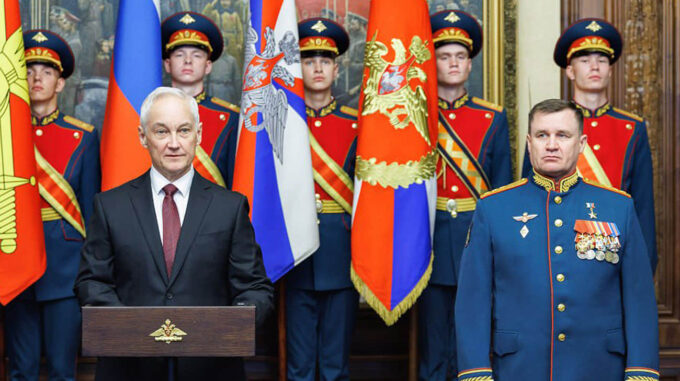There have been significant personnel reforms in the Russian army: General-Colonel Andriy Mordvichev has been appointed as the Commander-in-Chief of the Ground Forces

This decision became one of the key changes in the country’s military leadership structure, attracting the attention of experts and military analysts amid the current events surrounding Ukraine and the large-scale combat operations in Eastern Europe. According to official statements from the Russian Ministry of Defense, the new commander of the Ground Forces was awarded the high title of "Hero of Russia" for his role in capturing Avdiivka — a strategically important city in Donbas. It is noted that under Mordvichev’s leadership, the Russian armed forces managed to entrench themselves in occupied territories and advance within combat zones. Russian Defense Minister Andrey Beliousov characterized him as an “experienced combat officer” who demonstrated his best military qualities and strategic thinking during the “special military operation.” According to sources on Telegram channels affiliated with the Russian Ministry of Defense, Mordvichev’s appointment was not unexpected, as he already possesses experience leading military formations and has undergone a complex career development within the Russian army, starting from command positions in various military districts. It is worth noting that as early as March 2022, the General Staff of Ukraine announced his purported liquidation — highlighting the complexity and multifaceted nature of the information warfare Moscow is conducting against Kyiv. Russian military analysts point out that Mordvichev commanded the “Center” grouping of troops until recently, responsible for strategic operations in central and eastern Ukraine. According to Interfax, it was under his command that Russian forces captured Avdiivka at the end of February 2024, marking a significant victory within the framework of the so-called “special operation.” This indicates his professionalism and ability to conduct complex battles in rapidly changing tactical situations. Biographical details: Andriy Mordvichev was born on January 14, 1976, in Pavlodar (Kazakhstan). His military career began in 1997 after graduating from the Novosibirsk Higher All-Combined Arms Command School. He later received higher military education, graduating in 2006 from the General Military Academy of the Russian Armed Forces. After completing his academic training, he held a series of responsible positions: from 2016, he was appointed deputy commander of a corps, and from 2017 to 2019, he served as chief of staff and first deputy commander of the Army of the Central Military District. In subsequent years, his career rapidly advanced: from 2019 to 2021, he was chief of staff and first deputy commander of the 8th Combined Arms Army of the Southern Military District, and from 2021 to 2022, he served as commander of the same army. At the same time, in 2022-2023, he held the position of Deputy Commander of the forces of the Southern Military District. In 2023, he was appointed commander of the forces of the Central Military District, further strengthening his authority within military circles. Recently, there was news about changes in the senior command: on May 15, Vladimir Putin, the Kremlin head, dismissed Lieutenant General Oleg Salyukov from his position as Commander-in-Chief of the Ground Forces. He was replaced by the Deputy Secretary of the Russian Security Council, signaling potential shifts in strategic military priorities. Oleg Salyukov had been in charge of the Ground Forces since 2014 and was one of the key figures in the structure of the Russian military. It is clear that these personnel reshuffles are occurring in the context of an intensified conflict in Ukraine, as Russia concentrates significant resources to secure its positions in occupied territories and plans new military operations. Strengthening the command structure and appointing experienced figures with combat backgrounds indicate the Kremlin’s intent to reinforce its positions and possibly prepare for further escalation on the frontlines. At the same time, experts do not consider these personnel decisions to signal fundamental changes in Russia’s military doctrine. Instead, they emphasize that these moves demonstrate the Kremlin’s desire to maintain control over military processes and to bolster its authority—primarily among officers and military structures responsible for combat training and strategic planning. To this end, appointing experienced commanders with combat experience capable of managing complex operations aims to enhance the country’s defense capabilities. Ultimately, personnel changes within Russia’s military leadership serve as an important signal not only for internal policy but also for international partners and opponents. Time will tell how effectively the new Commander-in-Chief can implement his tasks amid the large-scale hostilities and the tense global political situation on the eve of new conflict phases.

